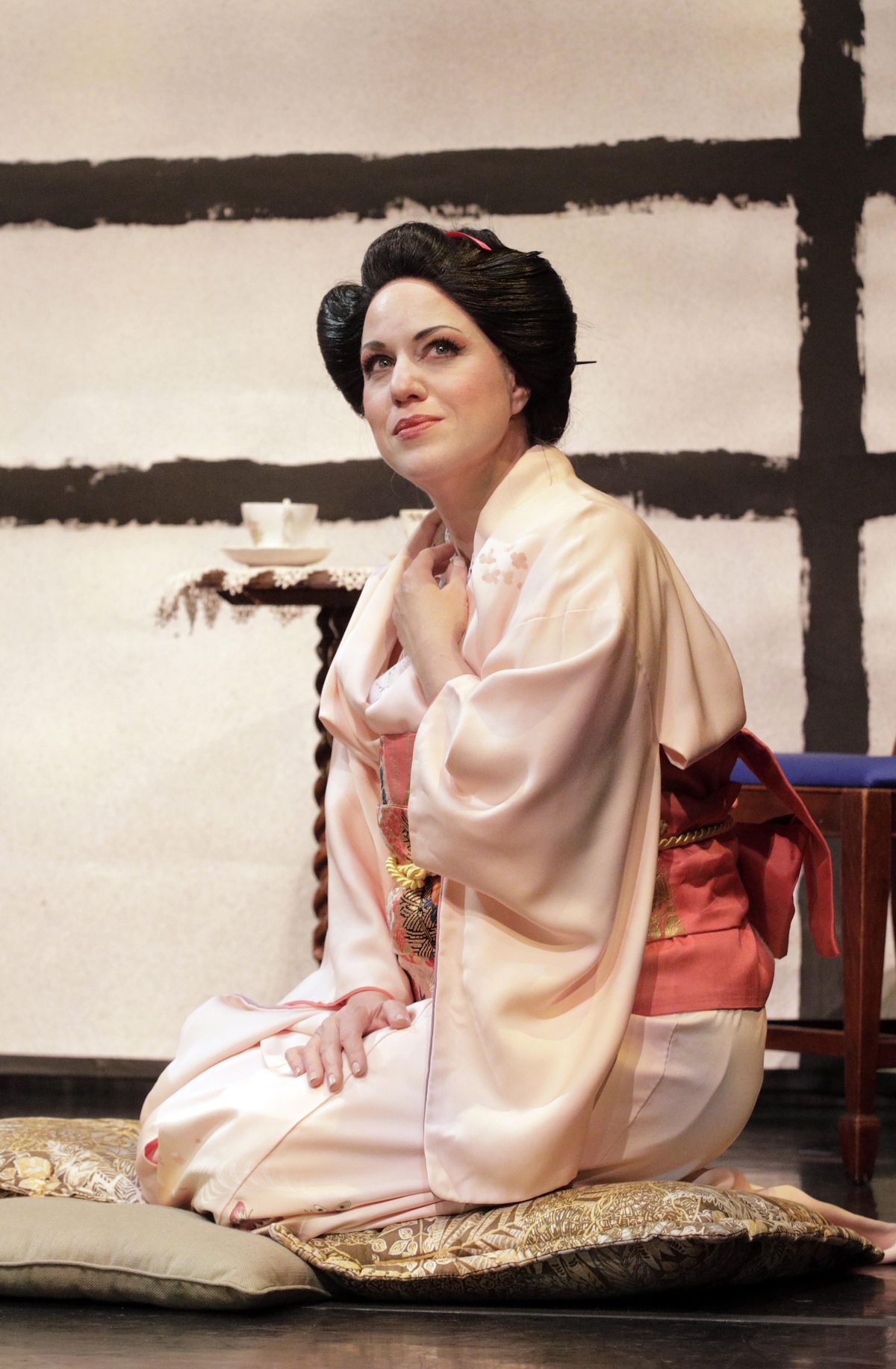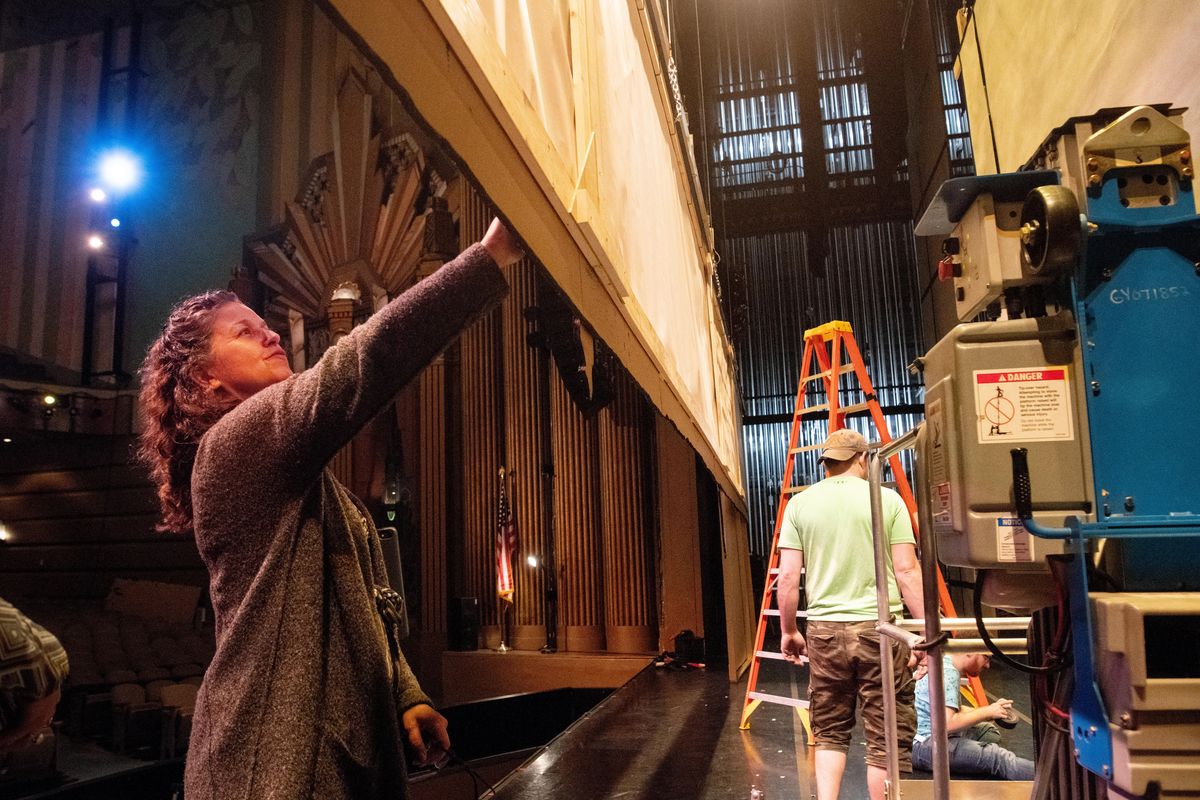Review: Elizabeth Caballero, cast mates soar in INO’s ‘Madame Butterfly’ at the Fox

Though the Inland Northwest is geographically isolated from the great centers of opera production such as New York, Chicago, San Francisco and, we should add, Seattle, a passionate dedication to the art of great singing is deeply woven into our cultural fabric.
Inland Northwest Opera, now under the leadership of general director Dawn Wolski, herself a marvelously gifted singing actress, is the latest and most vital flowering of a vocal tradition founded and nurtured by artists, teachers and philanthropists such as Sherry Knott, Marjory Halvorson and Sr. Marietta Coyle.
INO’s current gift to our region is a production of Giacomo Puccini’s durable masterpiece “Madame Butterfly” (1906), which is being presented in two performances this weekend at Martin Woldson Theater at the Fox (7:30 p.m. Friday and 2 p.m. Sunday, with pre-talk sessions one hour before curtain call), and features dramatic singing of such quality as any great opera house would be proud to present.
Though it is based on literary materials first published in the 19th century, the theme of “Madame Butterfly,” which is the destructive potential of arrogant male sexuality, is regrettably pertinent to U.S. current affairs.
The opening of the opera, set in Nagasaki, Japan, at the turn of the 20th century, lays out a sharp contrast between the delicacy and refinement of Japanese culture, represented by Cio-Cio San, or Butterfly, and that of the United States, personified in the character of Benjamin Franklin Pinkerton, a lieutenant in the U.S. Navy.

Pinkerton is possessed by a desire to take the virginity of the 15-year-old Butterfly and regards marriage to her as a trivial formality necessary to the accomplishment of his goal. Taken in as much by the glamour of his Americanism as by his melting smile and winning words, the vulnerable Butterfly falls deeply in love with the lieutenant, a love that she sees extending to the end of her life.
She is correct, though that life only lasts for three more years, ending in suicide, while true love finds no more room in the brutish heart of Pinkerton than it would have in those of Harvey Weinstein or Jeffrey Epstein.
The success of any production of “Madame Butterfly” depends on the performer in the title role, and this production was virtually assured of success by its choice of soprano, Elizabeth Caballero. Early in her career, she appeared in Coeur D’Alene in a production of Mozart’s “Cosi fan Tutte” by Western Opera Theater.
Recently, she electrified Spokane audiences as Musetta in Puccini’s “La Boheme” and by delivering an unforgettable rendition of the soprano part in the Verdi Requiem. On Friday evening, Caballero allowed us to watch the character of Butterfly grow from a naïve girl into a courageous woman by mastering every technical challenge of her role.
During the course of the opera, she skillfully altered the scale of her voice, starting from a pure, silvery thread of sound, ultimately to explore the full, thrilling spectrum of color found in the lyric soprano voice. Dramatically and musically, Caballero showed herself to be the complete artist, delivering a performance of one of opera’s most demanding roles that left room for nothing but praise.
Before we see Butterfly, we meet Pinkerton and learn what is in store for our heroine. His is the first voice we hear from the stage, and the voice of Chad Shelton, our Pinkerton in this production, was immediately striking in its combination of brightness and warmth. To project the brash, aggressive nature of his character, Shelton had the courage to “oversing” the part a bit rather than observe the standards of vocal beauty tenors normally strive to maintain.
It would have been incongruous to hear elegant singing issuing from a character who announces his willingness to “crush the wings” of the creature he means to possess. Likewise, Shelton made the Pinkerton of Act III, who is suddenly struck by awareness of his own contemptible selfishness, remarkably vivid and credible by marshalling the brazen foundation of his voice to support the ringing high notes. It was a performance that made one eager to see him take on such challenging roles as Britten’s Peter Grimes and, beyond that, perhaps Wagner’s Siegmund.
The excruciating pity we feel for Butterfly is made more intense by two other characters: her devoted servant Suzuki and Sharpless, the American Consul in Nagasaki. Though the role of Suzuki is a secondary one, assigning it to such a superb artist as mezzo-soprano Sandra Piques Eddy not only elevated the impact of the part, but also the entire production.
Her beautiful voice, which we last heard singing in French as Carmen in INO’s production of that opera, was an ideal match for that of Caballero’s in the ecstatic “Flower Duet” of Act 2 and expressed a tone of loving compassion that kept the proceedings from veering into melodrama.
The part of Sharpless, who tries, albeit hesitantly and without success, to warn Pinkerton and Butterfly of the dangers of failing to see each other as they truly are, was taken by baritone Corey McKern. He sang with such consistent warmth and beauty of tone, and rendered his words with such emotional specificity, that the audience reacted with sympathy and admiration rather than the annoyance often felt for his character.
Molding the musical shape of the performance was conductor Dean Williamson. As in all of Puccini’s operas, the role of the orchestra in “Madame Butterfly” is not one of accompaniment but of equal participation with the singers in tracing the work’s tragic arc. Williamson seemed to have internalized not only every bar of the score, but also every word and mark of punctuation, and to communicate the ideal pace and emphasis with which they should follow each other.
The orchestra under his direction was made up almost entirely of present and former members of the Spokane Symphony, including many who occupy its principal chairs. The beauty and precision of their playing, not to mention their inexhaustible stamina, were essential to the production’s ability to rivet the attention of the audience and engage their emotions so profoundly.
The stage design of this production was its most strikingly imaginative and innovative element. Under the direction of stage designer Fenlon Lamb and set designer Jefferson Ridenour and his crew, operating under the name of Papermoon Opera Productions, they framed the action with shoji-like panels suspended from the flies above the stage at the Fox and projected images upon them that intensified, amplified and commented upon the drama.
When Sharpless posed the awful question to Butterfly, “How would you feel if you never saw him (Pinkerton) again?,” the tranquil landscape projected behind them was abruptly replaced with a video of swirling, impenetrable fog, suggesting the loss of the bright future for which Butterfly had hoped. It is difficult to imagine how conventional sets and props could have expanded artistic reach of the production to such an extent.